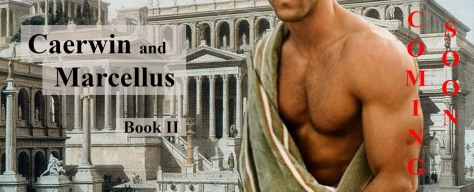Finished! A week ago, I finished writing the last page of the second novel about Caerwin. I’ve been sad ever since. How do you live with two compelling characters for over two years and not get attached? I’ve watched them grow, fight, suffer, and grow some more. Now they become part of my past. I’ll miss them.
Truth be told, I’ll miss more than Caerwin, Marcellus, and supporting cast. I’ve been immersed in Imperial Rome with all its triumphs, perversions, violence, and accomplishments. The fascinating world that was Rome endured a thousand years. Looking back on those years, the progress of their culture, and the countless ways in which we today follow in their footsteps is both depressing and exhilarating. It’s impossible to imagine where we would be today without Rome.
While I sing Rome’s praises, I also recognize how much better we are today than the people of Rome. For one thing, we don’t accept slavery as the norm. Rome’s social class system included the ‘noble’ classes (patricians and equestrians) who considered work beneath them. They held the bulk of the empire’s wealth, controlled its government and industries, and owned both city houses and country villas. The plebian class, roughly equivalent to our middle class, were the freeborn men or freedmen who worked every day to sustain the modest circumstances in which they lived.
Then there were the slaves, vast numbers of persons captured in Rome’s relentless military expansion over most of the known world. Wealthy household might have as many as 300 slaves. Slaves were like livestock or furniture–zero rights. Could be raped, branded, or killed without consequence. Yet they could also become part of a family, cared for, and often freed to live as freedmen (and women).
So while we can thank Rome for establishing the foundations of our legal system, our economic system, our tradition of the arts, social customs, and more, we can also thank the people who came after–from the Dark Ages to the Middle Ages to the Renaissance and down to those who fight each generation for better working conditions, more social justice, refinements of law and wage equity for the conditions we live in today. It’s a sobering perspective.
And this, dear friends, is why writing historical fiction will always be part of my writing experience.
